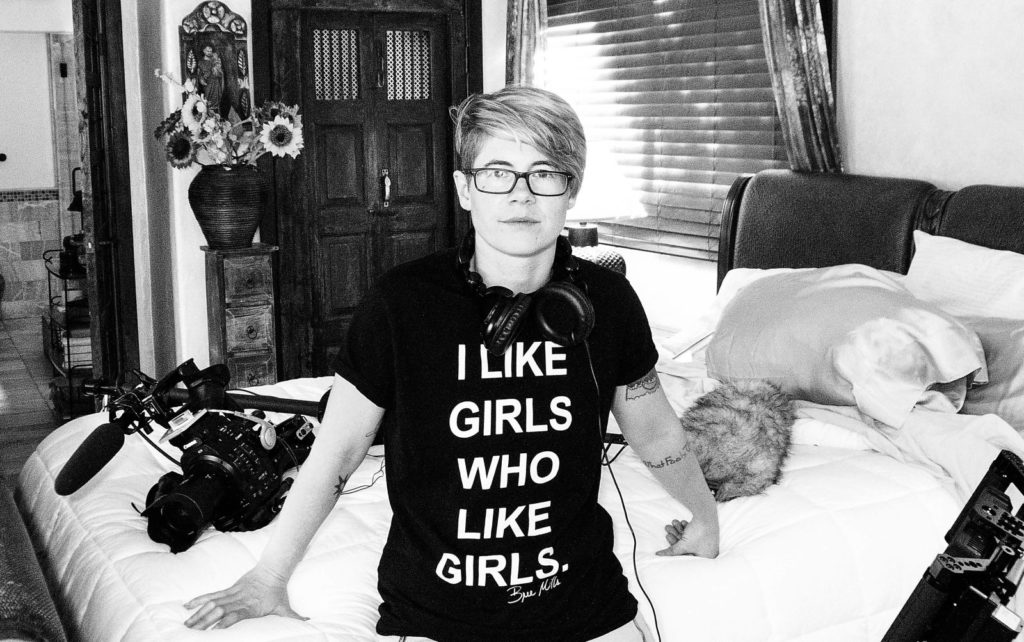I recently corresponded with Tracy Clark-Flory, writing for Jezebel, who was working on a profile of director Bree Mills.
Mills currently is the head of production at Gamma Films and was integral in the development, creation, and production of sites Girlsway and PureTaboo. She’s a really good speaker who I have invited to participate in panels I have organized in the past.
You can read Clark-Flory’s long form, super interesting piece right here — “Can a Woman Get Away With Making Fucked Up Faux Incest Porn Like No Man Could?” (October 4, 2018) — and you can read my full discussion with her regarding Mills’ work and symbolic place in content production below.
Enjoy!
—
Tracy Clark-Flory: I’m working on a profile of Bree Mills, and I’m wondering if you have any thoughts to share on her work or impact within the industry. I’m especially interested to hear any thoughts you might have on how her gender has influenced her career. Some folks have suggested to me that she’s able to “get away with” much darker, edgier content as a woman…
DrCT: Does Bree Mills “get away with” exploring themes in her content that other directors would somehow be sanctioned for, and does she “get away with” it because she’s a woman? Maybe. And maybe she “gets away with” it because of her sexuality or her age or her haircut… or some combination of all these factors and/or others.
We have a long history of regarding “taboo” behavior in women, for instance, as less intense or worthy of less punishment than men. (See for instance, Debra “too pretty for prison” Lafave, an actual criminal.) So sure, it could be that the squeamish public is less squeamish about content that that explores taboo themes if a woman creates it versus a man. I however find that particular explanation to be a bit shortsighted.
Obviously, the content Mills creates is legal and fantasy fiction – just like Hollywood films portraying bank robbery or superheroes are acting and fantasy, there is no actual kidnapping or incest or whatever happening in Mills’ films.
The adult industry, however, has a long history of obscenity fear. Especially pre-internet, the Miller Test made it possible for adult content – any content really, though this was really only used to target adult – to be accused of obscenity. And just getting accused of obscenity is a very bad thing…
[Aside: This entire history is outlined in “When Law Moves Quicker Than Culture – Key Jurisprudential Regulations Shaping the U.S. Adult Content Production Industry” (here) The Scholar: St. Mary’s Law Review on Race and Social Justice, 2013.]
As a consequence, the industry started abiding by its own internal production code known as the Cambria list. There are a litany of things itemized on this list, many of which that would shock you in their mildness, that industry producers began avoiding in order to head off potential attacks from the government, activist groups, etc.
Fast forward to today. The world has changed dramatically. Though we as a society are still equally clueless about how adult content is produced and about the culture of the community and workspaces — not to mention anxious about sex and sexuality and sex depictions — the notion that content is obscene just because one person doesn’t like it has all but vanished.
As such, in my view, at least part of the reason why Mills “gets away with” her taboo content is because she is just doing it – going for it in 2018. Whereas much of the industry is still (understandably) hanging on to old fears, Mills may not be. Or she may just be bold enough to know that she could challenge these issues were they to come knocking at her door.
Now, this doesn’t mean that her exploration of this type of content doesn’t come at some cost. I know for a fact that some larger companies in the business will not sell/distribute her content due to fear of sanctions from mainstream payment processors. Certainly this impacts her sales/returns, etc…
In my view though, though Mills’ persona herself may certainly have some impact on how her content is received, the fact remains that – though possibly dicey – there is also not the same specter of prosecution that shaped content production in past decades. For someone who may be uncomfortable with Mills content today, the simple answer is: “Many people like it, and there is nothing illegal going on. If you don’t like it, stop watching it.”
(pictured: Bree Mills, image via Jezebel)
—
Got a sociology question? Need some social justice informed life advice? Contact Dr. Chauntelle right here.
Get your copy of Exposure: A Sociologist Explores Sex, Society, and Adult Entertainment on Amazon here.
